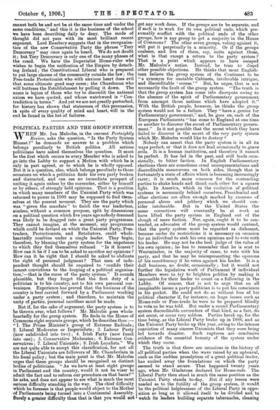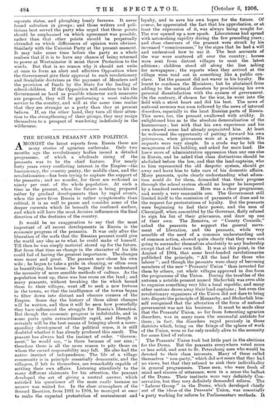POLITICAL PARTIES AND THE GROUP SYSTEM.
WHEN Mr. Ian Malcolm, in the current Fortnightly Review, asks the question, "Is the Party System Honest ?" he demands an answer to a problem which belongs peculiarly to British politics. All serious politicians have asked themselves the question. It must be the first which occurs to every Member who is asked to go into the Lobby to support a Motion with which he is only in part agreed, or to which he is wholly opposed. But it is a question, also, which belongs peculiarly to those occasions on which a politician finds hie own party broken and distracted, and can see no immediate prospect of uniting it again unless by the surrender, either by himself or by others, of strongly held opinions. That is a position in which many members of the Unionist Party which was returned to power in 1900 may be supposed to find them- selves at the present moment. They see the party which was "given the mandate" to finish the war leaderless, aimless, without a common purpose, split by dissensions on a political question which five years ago nobody dreamed. was likely to be dragged into a great party programme. They cannot imagine, at the moment, any programme which could be devised. on which the Unionist Party, Free- traders, Protectionists, and Retaliators, could whole- heartedly combine under a single leader. They begin, therefore, by blaming the party system for the impotence to which they find themselves reduced. "Is it honest ? How can it be if I am to be asked to sacrifice my opinions ? How can it be right that I should be asked to abdicate the right of personal judgment? That men of inde- pendent thought should. be required to confide their inmost convictions to the keeping of a political organisa- tion,'—that is the curse of the party system." It sounds plausible, but they forget that the first duty of a politician is to his country, not to his own personal con- veniente. Experience has proved. that the business of the country is best carried forward by a Parliament working under a party system ; and therefore, to maintain the unity of parties, personal sacrifices must be made.
But if, for the sake of argument, the party system is to le thrown over, what follows ? Mr. Malcolm goes whole- heartedly for the group system. He finds in the House of Commons eight separate groups, which he describes thus :— "1. The Prime Minister's group of Extreme Radicals ; 2. Liberal Moderates or Imperialists ; 3. Labour Party (now subdivided into two)' 4. Irish Party (now fused. into one) ; 5. Conservative Moderates ; 6. Extreme Con- servatives; Liberal Unionists ; 8. Irish Loyalists." We are not quite able to accept this classification, for not all the Liberal Unionists are followers of Mr. Chamberlain in his fiscal policy ; but the main point is that Mr. Malcolm urges that these groups should. be recognised as distinct bodies of politicians. "As we have at least eight groups in Parliament and the country, would it not be wiser to admit the fact and to reform our procedure on that basis?" he asks, and does not appear to see what is much the most serious difficulty standing in the way. The chief difficulty which he foresees is that people would object to the Mother of Parliaments being turned into a Continental Assembly. Surely a greater difficulty than that is that you would not get any work done. If the groups are to be separate, and if each is to work for its own political ends, which pre- sumably conflict with the political ends of the other groups, how is any group to get a majority in the House of Commons ? The other seven groups, voting against it, will put it perpetually in a minority. Or if the groups coalesce, and five of them, say, unite against three, what is that except a return to the party system ? That is a point which appears to have escaped. Mr. Malcolm's notice. Instead, he tries to dispel other possible objections. He thinks that most English- men believe the group system of the Continent to be "a synonym for unstable Cabinets, intolerable intrigue, and discreditable ' scenes.' " But, he urges, that is not necessarily the fault of the group system. "The truth is that the group system has come into disrepute owing to the absence of the spirit of Parliamentary government from amongst those nations which have adopted it." With the British people, however, he thinks the group system would not be a failure. They "have a genius for Parliamentary government," and, he goes on, each of the European Parliaments "has come to England at one time or another to discover the secret of Parliamentary govern- ment." Is it not possible that the secret which they have failed to discover is the secret of the very party system which Mr. Malcolm would. like to destroy ?
Nobody can assert that the party system is in all its ways perfect, or that it does not lead occasionally to grave evils. It is a human institution, and therefore it cannot be perfect. It has led in the past, and still leads occa- sionally, to bitter faction. In English Parliamentary elections there are sometimes cruel misrepresentations and discreditable manceuvres on both sides, though that is fortunately a state of affairs which is becoming increasingly rarer ; it is much more common for the contending parties to shake hands and thank each other for a square fight. In America, which in the evolution of political systems is necessarily behind. ourselves, Presidential and other elections are often enough marked by excesses of personal abuse and jobbery which we should. con- sider intolerable. But in the United States the same correctives will eventually be at work as have lifted the party system in England out of the slough of mere faction. Nor, again, ought it to be con- tended, as advocates of the group system would contend, that the party system must be regarded as dishonest, because under its restrictions it is necessary on occasion for an individual to sink his own opinions and to vote with his leader. He may not be the best judge of the value of his own opinion ; he has to remember that he is sent to Westminster, in the majority of cases, to vote with his party, and that he may be misrepresenting the opinions of his constituency if he votes against his leader. It is a dull business, no doubt, occasionally ; but it would not further the legislative work of Parliament if individual Members were to try to brighten politics by making it impossible for their leader to count on a following in the Lobby. Of course, that is not to urge that on all imaginable issues a party politician is to put his conscience in his pocket. He could not do so without loss of his political character if, for instance, on huge issues such as Home-rule or Free-trade he were to be prepared. blindly to vote as he was told. But under a sound. Parliamentary system discreditable surrenders of that kind, as a fact, do not occur, or occur very seldom. Parties break up, for the time being, as the Liberal Party broke up in 1886, and as the Unionist Party broke up this year, owing to the intense conviction of many sincere Unionists that they were being led towards disaster. Such ruptures are conclusive evidence of the essential honesty of the system under which they occur.
The truth is that there are occasions in the history of all political parties when the wave raised by an upheaval, such as the sudden proselytism of a great political leader, has sucked away the foundations on which the party seemed to stand secure. That happened twenty years ago, when Mr. Gladstone declared for Home-rule. The Liberal Party then stood in much the same position as the Unionist Party stands to-day. But if any lesson were needed as to the futility of the group system, it wotdd be the political helplessness of the Liberal Party in oppo- sition so long as it allowed itself to be divided and, to watch its leaders building separate tabernacles, cleaning separate slates, and ploughing lonely furrows. It never found salvation in groups ; and those writers and poli- ticians best served the party who urged that those points should be emphasised on which agreement was possible, rather than that other points should be perpetually obtruded on which differences of opinion were obvious. Similarly with the Unionist Party at the present moment. It may take some time before the party as a whole realises that if it is to have any chance of being returned to power at Westminster it must throw Protection to the winds. But that is no reason why it should not unite at once to form an alert and effective Opposition when the Government give their approval to such revolutionary and Socialistic doctrines as the payment of Members and the provision of funds by the State for the feeding of school-children. If the Opposition will combine to hit the Government as hard as possible whenever such measures are proposed, they will be performing a most valuable service to the country, and will at the same time realise that they are stronger as a party than they at present believe. If, on the other hand, they turn all their atten- tion to the strengthening of their groups, they may resign themselves to a prospect of wandering indefinitely in the wilderness.































































 Previous page
Previous page